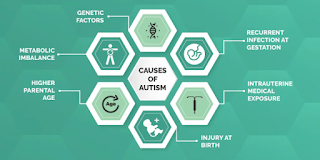Stem cell therapy is a cumbersome process. Patients undergoing therapy must be checked both physically and mentally. The cost of stem cell therapy for autism is determined by a variety of factors, including treatment availability, treatment quality, stem cell types used, overhead costs, and so on. However, expenses are not consistent in the majority of the countries. The cost of stem cell therapy in India is often one-tenth of what it is in the United States and the United Kingdom. Nonetheless, as compared to many other countries, India's treatment is extremely advanced. As a result, India is the most popular location for people seeking low-cost stem cell therapy for autism. A large number of highly competent professionals are accessible in India's various medical institutes and private hospitals.
Best Stem Cell Treatment For Autism In India
Posted by Advancells at 5:15 PMThursday, October 28, 2021
What you should know about autism spectrum therapies?
Posted by Advancells at 6:00 PMWednesday, October 13, 2021
People with autism can benefit from a variety of autism spectrum therapies that can help them enhance their skills and alleviate their symptoms. Early intervention, such as during preschool or before, boosts your child's odds of success, but it's never too late to get help. Instead of waiting for a formal diagnosis, you should start exploring therapies as soon as you suspect your child has autism. A formal diagnosis can take quite a long time, many tests, and follow-ups with specialists.
What works for one person may not work for
another. Learn about some of the most popular and effective – Autism spectrum
therapies.
- Occupational Therapy
Occupational therapists work collaboratively
with parents, teachers, and other professionals as part of a team. They aid in
the development of specific goals for autistic individuals. These objectives
frequently involve social interaction, behavior, and academic performance.
Assessment of autistic children and providing therapies accordingly are the two
main motives of occupational
therapy.
- Speech Therapy
Children with ASD may struggle with both verbal
and nonverbal communication. They may also experience difficulties interacting
socially. For these reasons, speech therapy
is an integral part of autism therapy. It assists children in speaking,
communicating, and socializing with others. Nonverbal skills such as making eye
contact, taking turns in a conversation, and using and understanding gestures
can all be involved in speech therapy.
- Applied Behavior Analysis (ABA)
This therapy utilizes benefits to reinforce
positive behaviors and teach new skills. Parents and other caregivers are given
the training to provide autistic children with moment-by-moment feedback. There
are different types of ABA such as Early intensive behavioral intervention
(EIBI), Discrete trial training (DTT), Verbal behavior
intervention (VBI)Verbal behavior intervention (VBI), Pivotal response
treatment (PRT).
- Play Therapy
Children with autism tend to play differently
than other children. They will more likely concentrate on specific pieces of a
toy (such as wheels) rather than the entire toy. They pretend to play in the
same way as other children do. And they might not want to play with other kids.
Many children with autism spectrum
disorder communicate themselves via play; their toys and movements may
become their language. Play can help children with ASD in literacy and connecting with others, both children and adults, in a way
that they understand.
Alternative Autism
Therapy: Stem Cell Therapy
Autism is a strong candidate for stem cell
therapy because there are indications that some types of stem cells, when
administered intravenously, can improve immune system regulation and neural
connections in the brain. Mesenchymal Stem Cells (MSC) are the most common type
of cell used to treat autoimmune diseases and inflammation. MSCs are the most
widely used cell type in regenerative medicine because, in addition to their
ability to cure any type of inflammation, the cells also do not stimulate the
immune system of the patient to detect them as invasive. This has the huge
benefit of allowing a clinic to receive MSC from unrelated donors and use them
as autism spectrum therapy.







